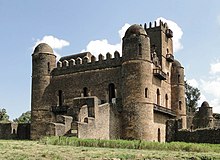Fasilides
Fasilides or Basilides ( Ethiop. ፋሲልደስ , throne name Alam Sagad ዓለም ሰገድ , "before whom the world bows"), German also for short Fasil , (born November 10, 1603 in Magazaz in the Kingdom of Shewa ; † October 18, 1667 ) was from 1632 until October 18, 1667 Negus Negest ( Emperor ) of Ethiopia .
Life
He was the son of Emperor Sissinios and Empress Sultana Mogassa of the ruling Solomon dynasty and was born in Magazaz in Shewa before November 10, 1603 .
As early as 1630, after an uprising by Sersa Krestos, Fasilides was proclaimed emperor. Only after his father's resignation in 1632 was he able to ascend to the throne in 1632. Immediately after taking office, he tried to restore power to the Ethiopian Orthodox Church . He had a new Abuna appointed by the Patriarch of Alexandria , thereby reviving an old but neglected connection. At the same time he had the Jesuits' land in Dankaz and other places in the empire confiscated and banished them to Fremona . When he learned of the Portuguese bombing of Mombasa , Fasilides believed that the Roman Catholic prelate Alfonso Mendez was behind this act, which led him to expel the rest of the Jesuits from the country. Mendez and most of his followers managed to return to Goa . They were robbed and imprisoned several times on their way there. In 1665, Fasilides ordered that the remaining religious writings of the Catholics, the "Books of the Franks", be burned.
In 1636 he founded the future city of Gonder and expanded it into the capital. In 1637 he undertook campaigns against the troublemaker Agau . Until the end of his reign he was busy repelling attacks by the Oromo in his empire and undertaking punitive expeditions against the Agaw (Agau).
In the years 1664-1665 sent Fasilides an embassy to India to Aurangzeb to his throne in the Mughal Empire to congratulate. When his son Dawit rebelled against him in 1666, Fasilides had him thrown into the dungeon at Wehni . He was following the very old custom of detaining annoying members of the imperial family on mountain tops, just as before on Amba Geshen .
Fasilides died in Azazo , eight kilometers south of Gonder. His body was buried in the monastery of St. Stephen on the island of Daga in Lake Tana . When Nathaniel T. Kenney saw the remains of Fasilides, he also noticed a smaller mummy in the same coffin. According to one monk, it was Fasilides' seven-year-old son Isur, who had been crushed in a crowd in honor of the new king.
Individual evidence
- ^ Nathaniel T. Kenney: Ethiopian Adventure . In: National Geographic . Volume 127, 1965, p. 557
| predecessor | Office | successor |
|---|---|---|
| Sissinios |
Emperor of Ethiopia 1632–1667 |
Yohannes I. |
| personal data | |
|---|---|
| SURNAME | Fasilides |
| ALTERNATIVE NAMES | Basilides; Alam Sagad (throne name) |
| BRIEF DESCRIPTION | Negus (Emperor) of Ethiopia |
| DATE OF BIRTH | November 10, 1603 |
| PLACE OF BIRTH | Magazaz , Kingdom of Shewa |
| DATE OF DEATH | October 18, 1667 |
